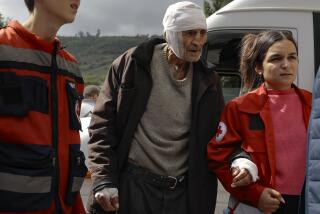Azerbaijan’s No. 2 City Seized by Rebel : Uprising: Warlord demands premier’s ouster. Dozens are killed as crisis underlines instability in former Soviet republic.
- Share via
MOSCOW — A pro-Communist warlord has refused to give up military command of Azerbaijan’s second-largest city, provoking street fighting, dozens of deaths and a severe political crisis in the former Soviet republic, officials there said Monday.
Reports from Gyandzha, a city of 40,000 people, said rebel soldiers captured the nation’s prosecutor general and two security officials. The three, who had arrived from the capital with pro-government troops Sunday to arrest the revolt’s leader, were being held hostage.
Police officials said by telephone that at least 50 people died in three days of fighting before President Abulfez Elchibey withdrew his forces and sent a team to negotiate with rebel leader Suret Guseinov, who has hoisted red Communist flags on public buildings.
Guseinov, a disgraced army commander in Azerbaijan’s war with neighboring Armenia, was demanding the prime minister’s resignation and an emergency session of Parliament to decide who controls the city and who is to blame for the weekend fighting.
An independent Azerbaijani news agency, Turan, reported that the prime minister, Panakh Guseinov, no relation to the rebel commander, did resign in response to the demand. The resignation had not been officially announced, but Elchibey was expected to accept it.
The bloody, botched outcome of “Operation Typhoon,” aimed at removing Suret Guseinov from his local army command, was a major blow to a government already wounded in recent months by humiliating territorial losses in a 5-year-old war with Armenians in the enclave of Nagorno-Karabakh and their supporters in Armenia.
On the heels of a Russian army pullout of Moscow’s last troops from the country, the events in Gyandzha underline the instability of Azerbaijan’s young democracy as pro-Communist and pro-Western forces struggle for political supremacy and control of its fractious 15,000-man army.
“President Elchibey faces a tough choice: either to step up a confrontation and push the country into a bloody civil war or to call an urgent session (of Parliament) and face a serious opposition challenge,” Leila Yunusova, an Independent Democratic Party activist who once worked in the Elchibey government, said in an interview from Baku, the capital.
The trouble started in February after Guseinov’s 2nd Corps suffered a string of defeats in Nagorno-Karabakh, an Armenian-populated enclave of Azerbaijan that is seeking independence. He was stripped of that command and his job as Elchibey’s presidential representative in Nagorno-Karabakh. But he continued to run a local army unit of several hundred troops in Gyandzha, where he holds a seat in Parliament and owns a textile mill.
Elchibey moved to oust Guseinov from his last stronghold after Russia’s 104th Airborne Division, the final remnants of the Soviet Red Army in Azerbaijan, left Gyandzha on May 15, depriving the warlord of his most powerful allies and protectors.
The president ordered his army chief of staff to oust Guseinov, but he refused and was fired. Then the president sent troops from the National Guard and the Presidential Guard. Russia’s Itar-Tass news agency said those forces suffered most of the casualties in battles that left about 200 people wounded.
Politicians in Baku said the crisis would only strengthen the Communists, who oppose foreign investment and want to restore ties with Moscow.
Research assistant Sergei L. Loiko of The Times’ Moscow Bureau contributed to this report.
More to Read
Sign up for Essential California
The most important California stories and recommendations in your inbox every morning.
You may occasionally receive promotional content from the Los Angeles Times.













